Intersecting with Eternity
Credo in unum Deum, Patrem omnipoténtem,
factórem cæli et terræ, visibílium ómnium et invisibílium. …
The Nicene Creed, from which these sentences are taken, is a Christian profession of faith adopted at the First Council of Nicaea in 325. The year 2025 marks the 1700th anniversary of that gathering.
We mark Good Friday 2025 with a chapter in Intersecting with Eternity. Here, we recall the Creed and offer, by way of contrast, an essay by The Horn Gate prefaced with Latin and Greek versions of the exchange between Pontius Pilate and Jesus as recorded in John 18, an account of the events of the day on which Jesus was crucified.
***
Intersecting with Eternity is a mini-anthology of literary and artistic works, both past and present, that in some small way engage with the unbroken stream of human awareness and poetic self-reflection. It is a companion to The Tower of Reading and an extension of The Other China section of China Heritage.
— Geremie R. Barmé
Editor, China Heritage
18 April 2025
Good Friday
***
33 Then Pilate entered into the judgment hall again, and called Jesus, and said unto him, Art thou the King of the Jews?
34 Jesus answered him, Sayest thou this thing of thyself, or did others tell it thee of me?
35 Pilate answered, Am I a Jew? Thine own nation and the chief priests have delivered thee unto me: what hast thou done?
36 Jesus answered, My kingdom is not of this world: if my kingdom were of this world, then would my servants fight, that I should not be delivered to the Jews: but now is my kingdom not from hence.
37 Pilate therefore said unto him, Art thou a king then? Jesus answered, Thou sayest that I am a king. To this end was I born, and for this cause came I into the world, that I should bear witness unto the truth. Every one that is of the truth heareth my voice.
38 Pilate saith unto him, What is truth? And when he had said this, he went out again unto the Jews, and saith unto them, I find in him no fault at all.
39 But ye have a custom, that I should release unto you one at the passover: will ye therefore that I release unto you the King of the Jews?
40 Then cried they all again, saying, Not this man, but Barabbas. Now Barabbas was a robber.
This is modernity’s curse: to see the rot, to name it, to know—and still shovel the shit. You recycle. You vote. You carry a metal straw like a holy relic. It means nothing. Exxon drills. Bezos launches dicks into space. The Arctic boils. You eat avocado toast and hate yourself.
***
How to Die by Living
A User’s Guid to Modern Collapse
An Odyssey
The Horn Gate
19 March 2025
“For God doth know that in the day ye eat thereof, then your eyes shall be opened, and ye shall be as gods, knowing good and evil.”
— Genesis 3:5
Of the Alarm and the Mirror
There is now a great sadness to the world. Not a clean, howling grief, but of rot. A slow decay in the marrow of things. You feel it most in the morning, in those seconds before the alarm screech. The light is gray, a dreadful pale, like the inside of a coffin. You lie there, still half-drowned in sleep, and for a moment you almost remember—something. A question, supposedly. A question without words. A hunger with no name.
Then the alarm claws you back.
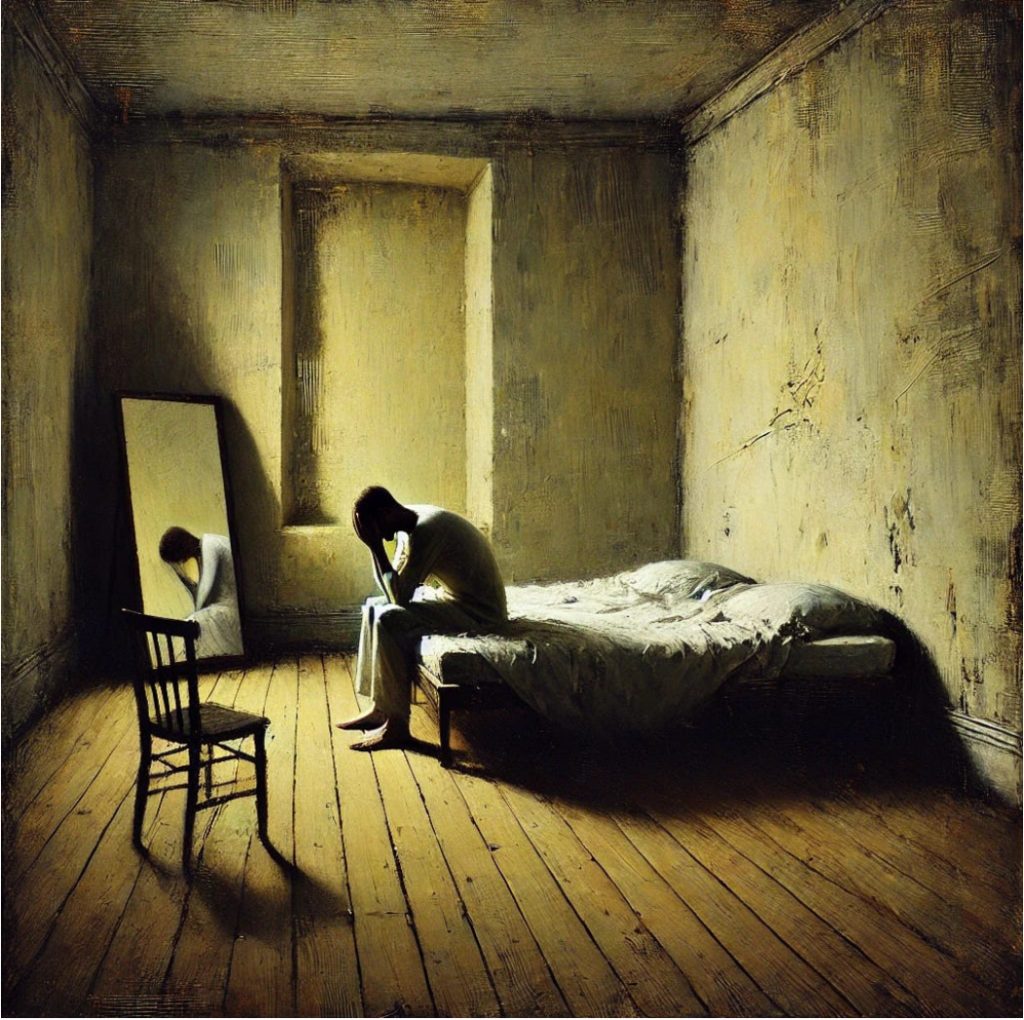
The bed is warm, but the warmth is a liar. It pretends to be a mother’s arms. It is not.
You rise. You face the mirror.
What stares back is a stranger’s face. The eyes are flat, like coins pressed into sourdough. The mouth—yours, but all wrong. A puppet’s slit. You think: This is what survival looks like. A thing pared down to function. A ghost in a suit, a shadow with a coffee cup. How time flies. How all life falls into the inconsequential without a look.
Modernity is that hole we keep trying to fill with noise. We jam it full of podcasts, tweets, TikToks, the 24-hour scream of news. Silence is the great enemy. Silence is where the rot whispers. So we drown it out. We cram our skulls with static. We scroll until our thumbs ache and the soul cries no more.
The phone is a priest. It absolves us of the sin of being alone.
The day begins and the emails swarm like flies. Meetings yawn open, hungry mouths. You sit in rooms where words die before they hit the air. Synergy. Bandwidth. Leverage. Empty syllables. You nod. You perform. Happy… or not… it doesn’t matter. At lunch, you eat a sandwich that tastes of nothing and scroll photos of children buried under rubble. A co-worker says, “Can you believe it?” You say, “I know.” You don’t. You can’t. The heart isn’t built to hold this much ruin. But it does. It will.
By evening, you’re hollow. You sit on the train, cheek smeared against cold glass. The city bleeds its light. Billboards sing: Buy this. Want that. Desire. You are incomplete. You’re nothing. You almost believe them.
At home, you collapse into a chair. The screen glows. Strangers laugh, dance, fuck, beg for attention. You tap a heart. The algorithm purrs: See? You’re not alone. But you are. Everyone is. We orbit each other in the dark, close enough to burn, never close enough to touch. Our lives in the black starry ether: the dark place between the stars.
Sleep doesn’t come. When it does, you dream of running. Not from anything. Toward nothing. Your legs won’t work. The air is syrup. You wake gasping. The clock glows.
The cycle begins again.
Of the Machine and the Guilt
The world is on fire. You know this. Oh, how you know this! You’ve seen the clips—glaciers bleeding into the sea, forests swallowed by flames, cities buried in smoke, souls begging in the ruination of all. You scroll. Your thumb twitches. A post demands DO SOMETHING. You click a heart. You share. You mute the video. The guilt is sour, metallic, like blood in the mouth.
They call it a “global conscience.” A lie. Rather a leash. You’re told to care about everyone, everything—starving children, melting ice, wars in languages you can’t pronounce. But caring costs. It costs time. Money. Sanity. You donate $5 to a GoFundMe for a stranger’s insulin. The receipt blinks: Thank you for your generosity. You close the tab. The machine doesn’t pause. Oil pumps. Guns ship. CEOs pocket your guilt like loose change: the ring of your endless conscience.
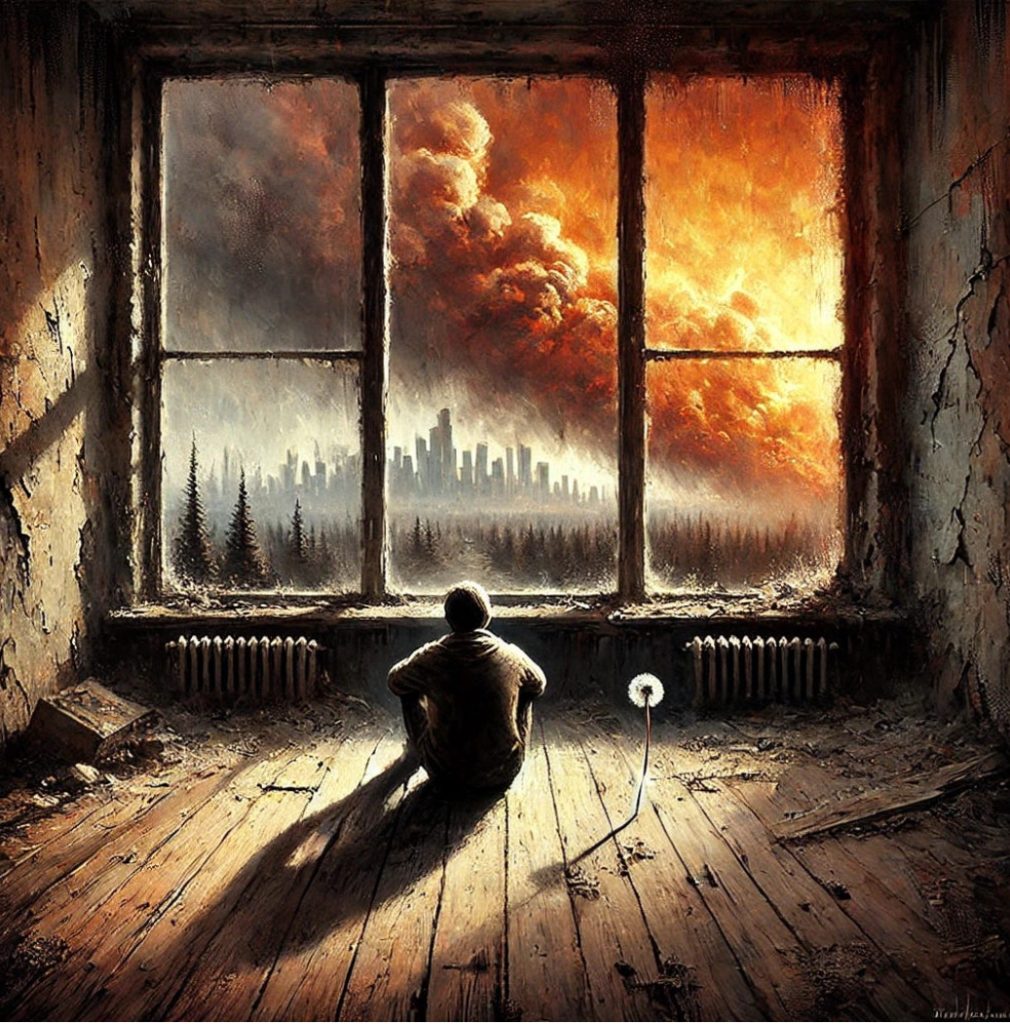
Capitalism swallowed God. Churches are condos now. The new cathedrals have logos—Apple, Nike, Tesla. We kneel at screens, fingers tapping prayers: Buy. Sell. Share. Repeat.
Activism? Another product. T-shirts scream RESIST! in child-labor cotton. Instagram infographics preach revolution between ads for teeth whiteners. You retweet Abolish Borders! then order a latte from a kid in Ecuador paid two pennies an hour. The hypocrisy stings. You lean into it. The machine loves your shame. It fuels the engine.
They call it “awareness.” A disease. You’re aware of every genocide, every extinction, every crooked politician. Aware but paralyzed. Your rage is a tweet, a slogan, a sticker on a laptop. The marches? Photo ops. The petitions? Trash. You scream into the void. The void screams back in memes.
This is modernity’s curse: to see the rot, to name it, to know—and still shovel the shit. You recycle. You vote. You carry a metal straw like a holy relic. It means nothing. Exxon drills. Bezos launches dicks into space. The Arctic boils. You eat avocado toast and hate yourself.
The worst part? The envy. You envy the blind, the numb, the ones who still believe the lies. The coworker who grins, “It’s not so bad!” The uncle who bellows, “Climate change is a hoax!” They sleep like babies. You lie awake, itching with truth.
Sometimes you try to quit. You delete Twitter. You meditate. You read Marx in the bath. It lasts a week. The machine drags you back. You need the job. The insurance. The fucking Wi-Fi. You’re complicit. You’re human.
Here’s the joke: the system wins by letting you rebel. Punk is a Spotify playlist. Che Guevara is a dorm-room poster. You sign petitions, join boycotts, scream into the void. The void files it under CONTENT and laughs its fateful laugh.
At night, you stare at the ceiling. The guilt curdles into something darker. Resentment.
Why you? Why must you care?
Let the world burn. Let it end. You’re tired.
But then—a flicker.
A dandelion cracking through concrete. A busker’s saxophone howling through subway stench. A moment so stupid, so useless, so utterly banal, it feels holy. Your son laughs, mouth smeared with chocolate. A cloud bruises the eternal purple of a dying sky.
You forget to check your phone.
The machine notices. It sends a notification. You swipe it away.
For now.
Of the Flesh and the Feed
Your body is the lie.
You scrub it, starve it, inject it with serums, film it for likes. You edit the shadows, filter the pores, contort it into poses that hide the truth: you are meat. Blood and bone. A thing that rots. But the feed demands immortality. You oblige. You post a gym selfie, #grind. You swallow pills for focus, for sleep, for the fakest of joys. You trade hunger for hunger—actual need for the ache to be seen, to be enough.
Modernity promised to transcend the flesh. Instead, it digitized the cage. Your body is a spreadsheet now. Calories burned. Steps counted. Sleep cycles graphed. You track your heartbeat like a stock ticker. You optimize, but the numbers never lie: you are decaying. The machine calls this “self-care.” You call it war.
Sex is a transaction. You swipe, fuck, ghost. Bodies reduced to bios: 6’2”, gym rat, no drama. Intimacy is a performance. You moan like a porn star. You check your reflection mid-kiss. Afterward, you lie there, sticky and hollow, scrolling strangers’ bodies to mute the shame. The feed calls it connection. It’s just two voids passing in the dark.
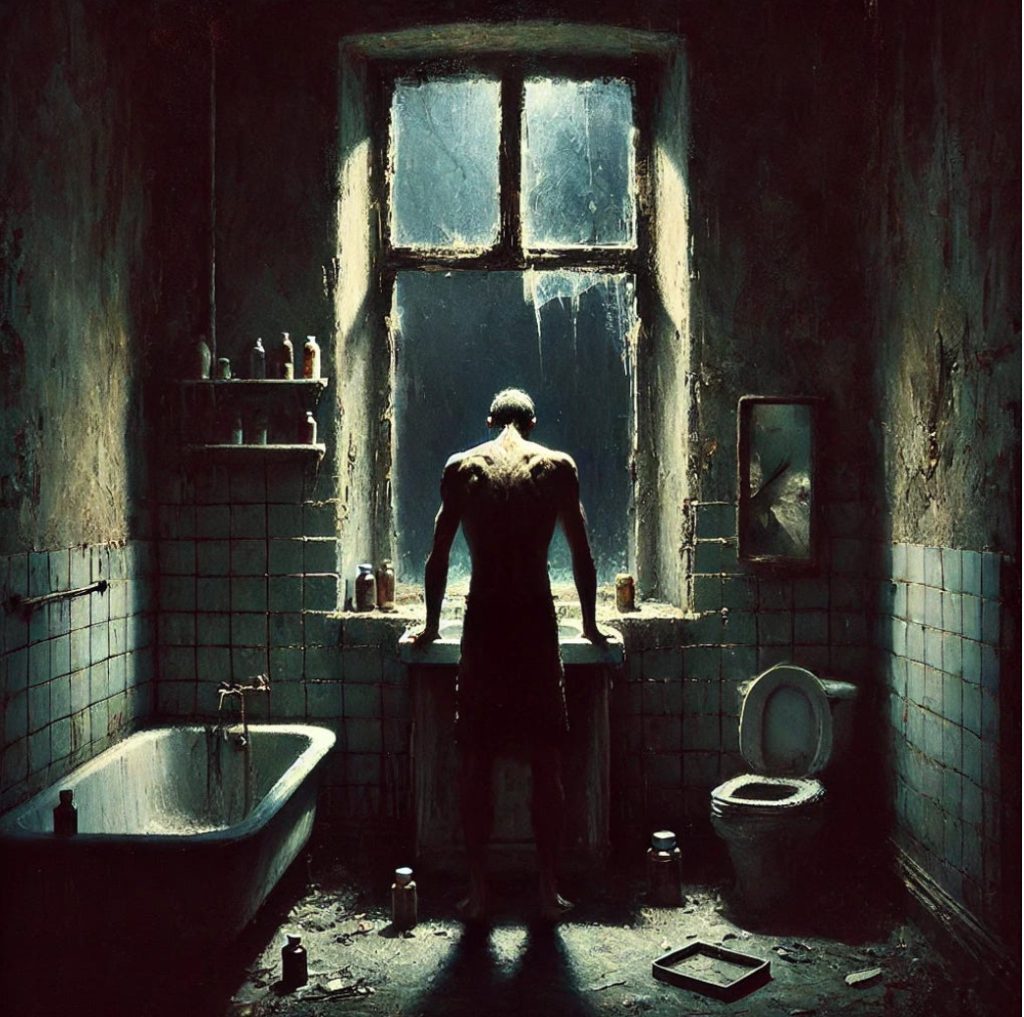
Aging is a glitch. You dye the gray. Botox the cracks. You chase youth like a tax evader, but the body betrays you. Knees creak. Sides sag. Mirrors hiss: You’re are fading, falling, breaking. The machine hates old meat. It wants fresh skin to sell. You’re 35. You’re ancient. You’re dead.
But sometimes—when the Wi-Fi dies, when the gym’s closed, when the meds wear off—the body screams. A cramp. A migraine. A panic attack in the cereal aisle. You clutch your chest, certain it’s a heart attack. It’s not. It’s just the flesh remembering: You’re alive. You’re here. You “are” dying.
You try to vanish. You binge, purge, starve, bleed. You run until your lungs shred. You’re still here. The body won’t let you go. It’s the last honest thing you own.
At 3 a.m., you stand naked in the bathroom light. No filters. No angles. Just the map of scars, stretch marks, moles. You trace them. This is the real you. The unpostable nothing. The feed would call it ugly. You call it proof. You lie?
Of the Child and the Rot
You were a child once.
You must’ve been.
You remember scraps—grass stains, a red balloon, the smell of rain on hot asphalt. Now you’re a fossil. A thing calcified by cynicism. They tell you to reconnect with your inner child. Therapists charge $200 an hour to say it. Influencers sell journals with prompts: What would little-you think of grown-you? Aren’t you grateful for anything? Something? Nothing? You want to scream. Little-you would vomit. Little-you would cry. Little-you is dead, buried under student debt and climate reports and the 10,000th mass shooting.
Modernity kills wonder. Not with a knife, but with a spreadsheet. You track your steps, your sleep, your carbon footprint. You optimize. You monetize. You turn your hobbies into side hustles. Even your dreams get drafted into service—Could this be a screenplay? A podcast?. The child didn’t dream of profit. The child dreamed to escape.
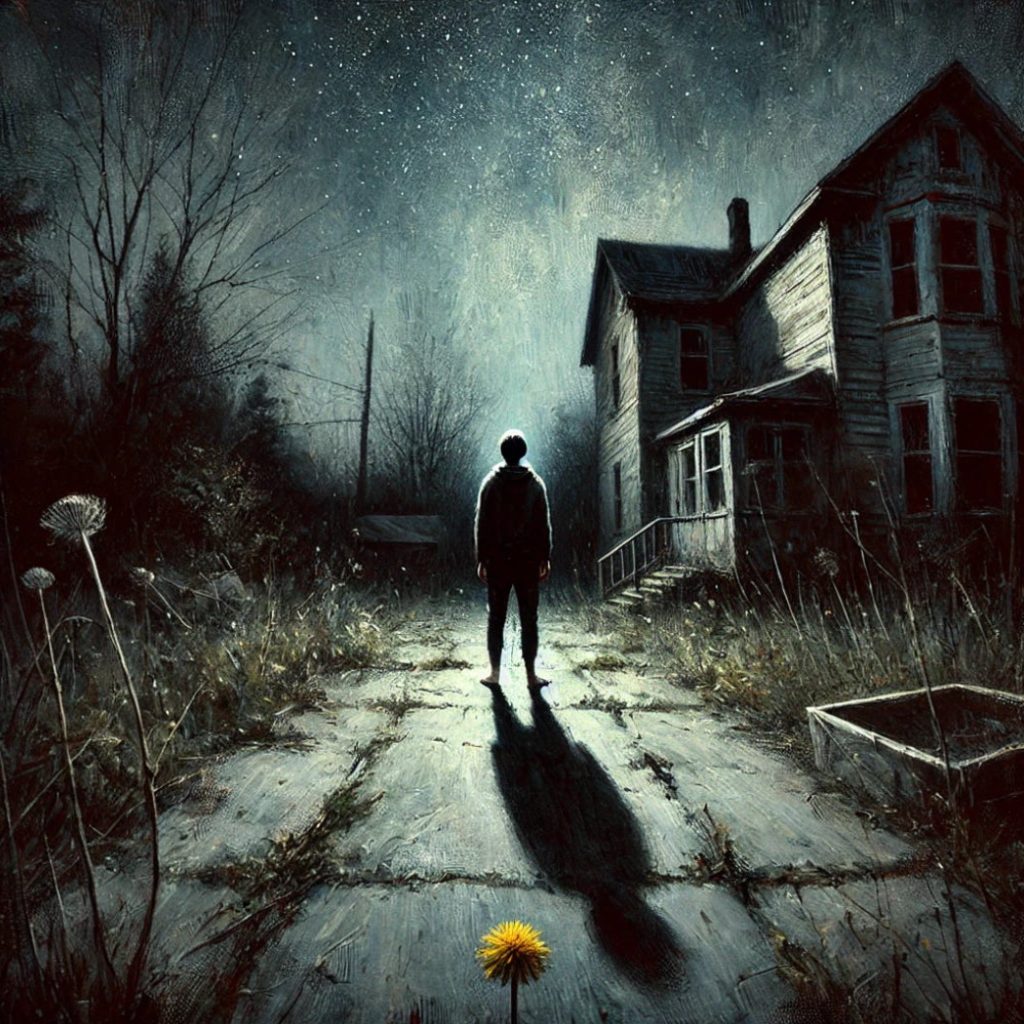
Escape. You try. You book a cabin in the woods. No Wi-Fi. No people. Just you and the trees and the unbearable weight of your own skull. Day one: you journal. The air smells like pine. Birds sing. I feel…. Day two: you pace. You check a dead phone. You talk to a squirrel. It flees. Day three: you drive back early, shaking. Silence is a mirror. You hate what stares back.
They sold you a lie: Be your own hero! Fix yourself! Fix the world!. Another trap. You can’t even fix your Wi-Fi. You eat vitamins, read self-help, chant the broken mantras. You’re still broken. The world’s still broken. The rot’s in the roots. You spray perfume on the leaves.
Here’s the truth they won’t say: There’s no cure. No enlightenment. No revolution. The machine’s in your bones now. You hum with it. You hate it. You need it. You’re the rat pressing the lever, starving but electrified.
Some nights, you crack. You stand barefoot in the yard, head thrown back, howling at the stars. The neighbors think you’re drunk. You’re not. You’re just alive. The stars don’t care. They’re dead already, their light a eulogy.
You think of death. Not in a way, just idly, like browsing shoes. Would it matter? You’d become a post. Gone too soon! Flowers emojis. A fundraiser. Then the feed refreshes.
But then—
A hiccup.
A glitch.
You’re in the grocery line. The cashier’s hands are chapped. She smiles at a toddler squalling in a cart. You watch her. Really watch. Her eyes are green. There’s a scar on her thumb. For a second, you see her: a girl, a woman, a knot of pain and hope. A universe. You want to say something. But the card reader beeps. The moment snaps. You leave.
It’s enough.
The child’s still in there, somewhere. Not the inner-child bullshit. The real one. The one that knows how to stare at a puddle for an hour. The one that doesn’t give a fuck about productivity or purpose. You feel it when you taste snow, when you hum a song you’d forgotten, when you bite an apple and juice runs down your wrist.
You won’t save the world. You won’t even save yourself. But today, you didn’t check the news. Today, you let a dandelion grow in the driveway. Today, you breathed.
The machine calls it a waste.
You call it a life.
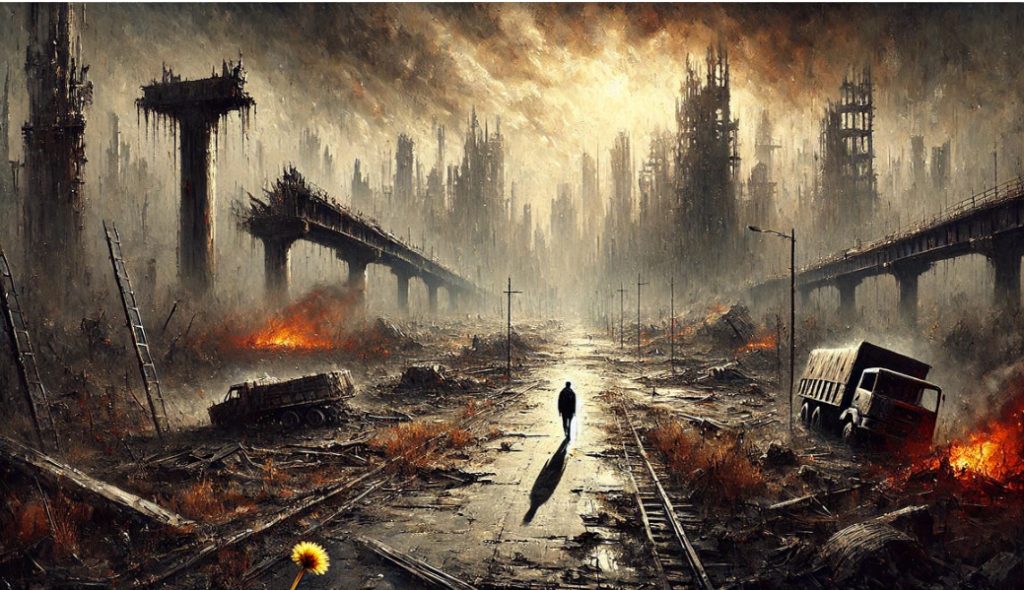
Epilogue: The Cracks
The world is ending. It has always been ending. This is the secret they buried under pyramids and skyscrapers and self-help books: We are born into collapse.
But look closer.
In the cracks—between the alarm and the mirror, the guilt and the scroll, the rot and the child—there is a pulse. Faint. Irregular. Yours.
You feel it when you bite into a peach and the juice stings your chapped lips. When you let the elevator doors close on a coworker’s small talk. When you ignore the news to watch a moth batter itself against a streetlamp. When you laugh, sudden and ugly, at nothing. When you don’t laugh for months. When you let the dandelions grow. When you rip them out. When you forget to hate yourself for an hour.
These are not victories. They’re not even rebellions. They’re leaks.
You are a broken pipe, bleeding life into the machine. The machine calls it waste. You call it proof.
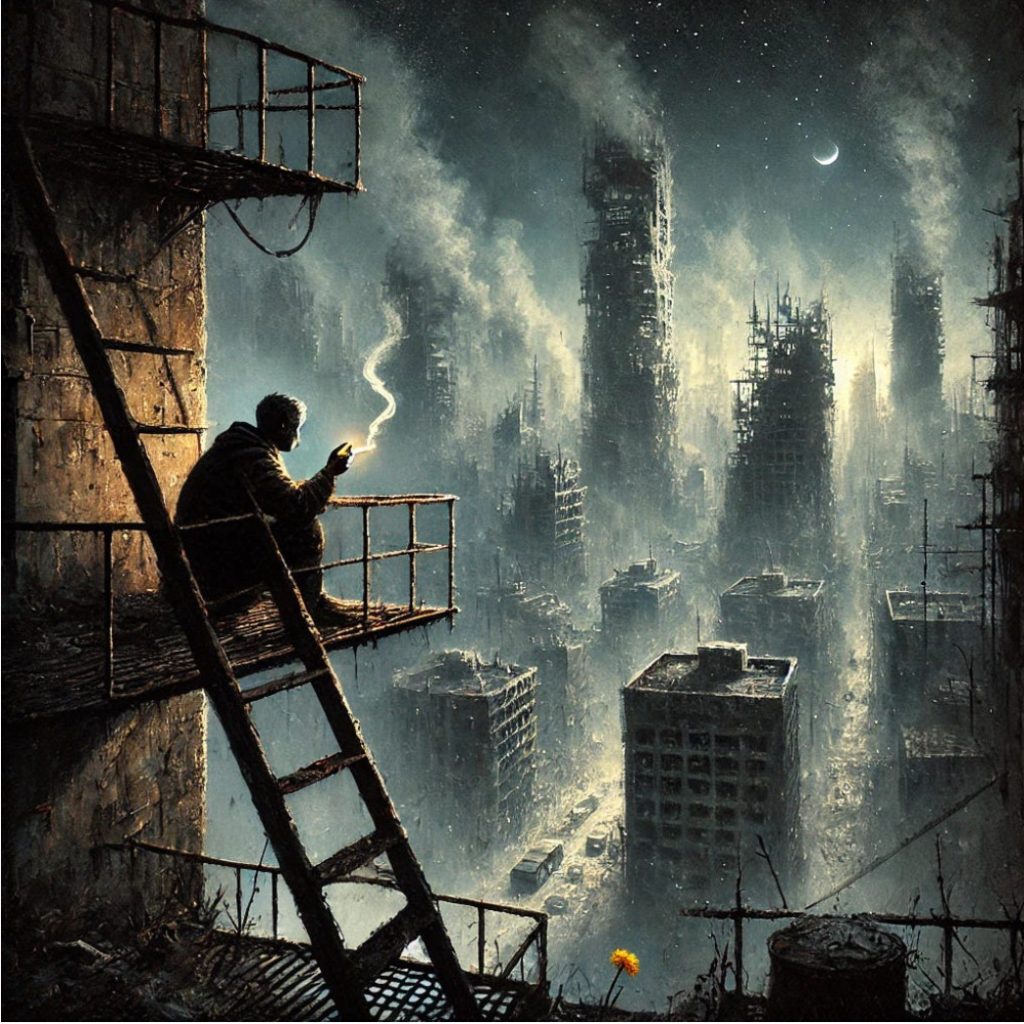
They told you to be a hero or a villain. To save or destroy. To mean something. Lies. You are neither. You are a wound that refuses to scab. A static hiss in the algorithm’s perfect hum. A flicker of bad reception on the edge of the broadcast.
So let it end. Let it all end.
But tonight, sit on the fire escape. Smoke a stolen cigarette. Let the ash fall into the dark like tiny burning paratroopers. Let your lungs ache. Let the stars—what’s left of them—judge you.
You are alive. Not good. Not healed. Not even brave.
Alive.
That’s the crack. That’s the rot. That’s the thing they can’t tax, can’t optimize, can’t put in a mission statement.
The world is ending.
You are here.
Let it tremble.
***
Source:
- The Horn Gate, How to Die by Living: A User’s Guide to Modern Collapse (An Odyssey), 19 March 2025. The Horn Gate substack is published by a writer and philosopher who speaks ‘through the Horn Gate-where dreams are true, prophetic, and reveal reality’s deepest layers and the joys that lie there. For the few, not the many…’. ‘The horn gate’ is a reference to Book 19 of the Odyssey.

